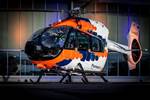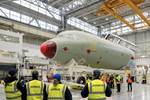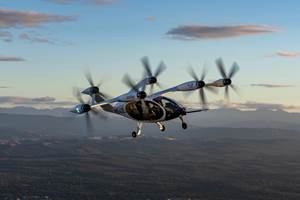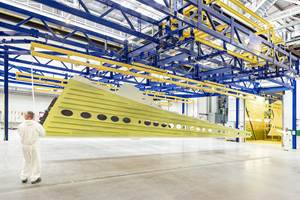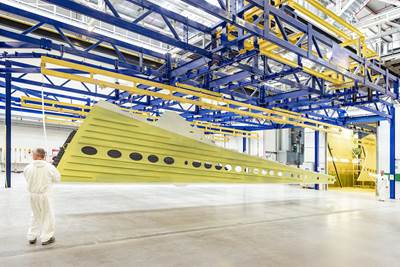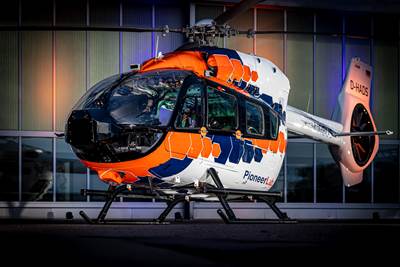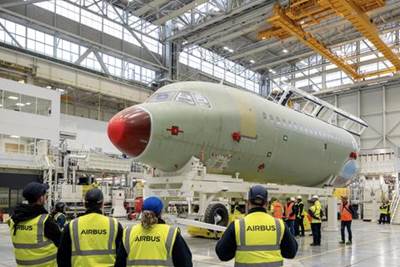Airbus reports widebody market recovery, production ramp-up progress
Nine-month 2023 earnings detail a 12% increase in consolidated revenue from 2022, meeting 2023 delivery targets and increased production rates for Airbus A350 widebody aircraft.
Airbus SE (Amsterdam, Netherlands), a global leader in aerospace, has announced its consolidated financial results for the first 9 months ending Sept. 30, 2023. The company’s CEO, Guillaume Faury, highlights the progress made in a complex global environment, with a notable increase in commercial aircraft deliveries and positive performance in the helicopter segment. These positive results have also led to the decision to increase aircraft product rates further for the A220 and A350 families.
“The 9-month earnings reflect higher commercial aircraft deliveries, good performance in helicopters as well as charges linked to the reassessment of certain satellite development programs,” Faury says. “Demand for our commercial aircraft is very strong with a continuing recovery in the widebody market. We expect the supply chain to remain challenging as we progress on the production ramp-up. In that context, we maintain our guidance for the full year.”
Gross commercial aircraft orders totaled 1,280, marking a significant increase from 2022’s 856 aircraft. Net orders after cancelations amounted to 1,241 aircraft, reflecting sustained demand for commercial aircraft. Order backlog reached 7,992 commercial aircraft by the end of September 2023. In the first 9 months of the year, Airbus handed over 488 aircraft, comprising 41 A220s, 391 A320 Family, 20 A330s and 36 A350s.
Per Aviation Week, revenues in Airbus’ commercial aircraft business increased 18% to €31.5 billion ($33.7 billion) based on the higher deliveries. Adjusted earnings before interest and tax (Adjusted EBIT) rose by 11.9% to €3.2 billion, a 10.2% margin. For complete financial details, click here.
Airbus assumes no additional disruptions to the world economy, air traffic, the supply chain, the company’s internal operations and its ability to deliver products and services.
The ramp-up on the A220 program is continuing toward a monthly production rate of 14 aircraft in 2026. Production on the A320 Family program is progressing toward the previously announced rate of 75 aircraft per month in 2026. The modernization and digitalization of the industrial system continues, as illustrated by the inauguration of the A321XLR equipment installation hangar in Hamburg. The A321XLR is progressing towards certification, with entry-into-service expected to take place in Q2 2024.
On widebody aircraft, Airbus has decided to increase the production rate for the A350 to 10 aircraft a month in 2026 and continues to target rate 4 for the A330 in 2024.
On the A400M program, development activities continue towards achieving the revised capability roadmap. Retrofit activities are progressing in close alignment with the customer. No further net material impact was recognized in the first 9 months of 2023. Risks remain on the qualification of technical capabilities and associated costs, on aircraft operational reliability, on cost reductions and on securing overall volume as per the revised baseline.
In order to cope with an evolving defense and security environment, the company has launched a transformation of its Defence and Space division. This aims to adapt ways of working, focusing on rigorous program execution and a rebalancing of risks and opportunities to reinforce end-to-end accountability and ownership in the business lines and improve competitiveness.
Airbus’ market outlook
The guidance issued in February 2023 is maintained. As the basis for its 2023 guidance, Airbus assumes no additional disruptions to the world economy, air traffic, the supply chain, the company’s internal operations and its ability to deliver products and services.
The company’s 2023 guidance is before M&A. On that basis, Airbus targets to achieve in 2023 around 720 commercial aircraft deliveries; EBIT Adjusted of €6.0 billion; and free cash flow before M&A and customer financing of €3.0 billion.
Related Content
Welding is not bonding
Discussion of the issues in our understanding of thermoplastic composite welded structures and certification of the latest materials and welding technologies for future airframes.
Read MorePlant tour: Joby Aviation, Marina, Calif., U.S.
As the advanced air mobility market begins to take shape, market leader Joby Aviation works to industrialize composites manufacturing for its first-generation, composites-intensive, all-electric air taxi.
Read MorePlant tour: Spirit AeroSystems, Belfast, Northern Ireland, U.K.
Purpose-built facility employs resin transfer infusion (RTI) and assembly technology to manufacture today’s composite A220 wings, and prepares for future new programs and production ramp-ups.
Read MoreCombining multifunctional thermoplastic composites, additive manufacturing for next-gen airframe structures
The DOMMINIO project combines AFP with 3D printed gyroid cores, embedded SHM sensors and smart materials for induction-driven disassembly of parts at end of life.
Read MoreRead Next
Plant tour: Spirit AeroSystems, Belfast, Northern Ireland, U.K.
Purpose-built facility employs resin transfer infusion (RTI) and assembly technology to manufacture today’s composite A220 wings, and prepares for future new programs and production ramp-ups.
Read MoreAirbus unveils PioneerLab twin-engine flying laboratory
Digital systems, bio-based and recyclable composites and other workstreams specifically dedicated to twin-engines will be tested and matured aboard Airbus’ helicopter demonstrator.
Read MoreAirbus inaugurates new Toulouse-based A320 final assembly line
Final assembly line will contribute to A320 Family production rate increase of 75 aircraft/month in 2026, adding to Airbus’ 10 assembly sites.
Read More


